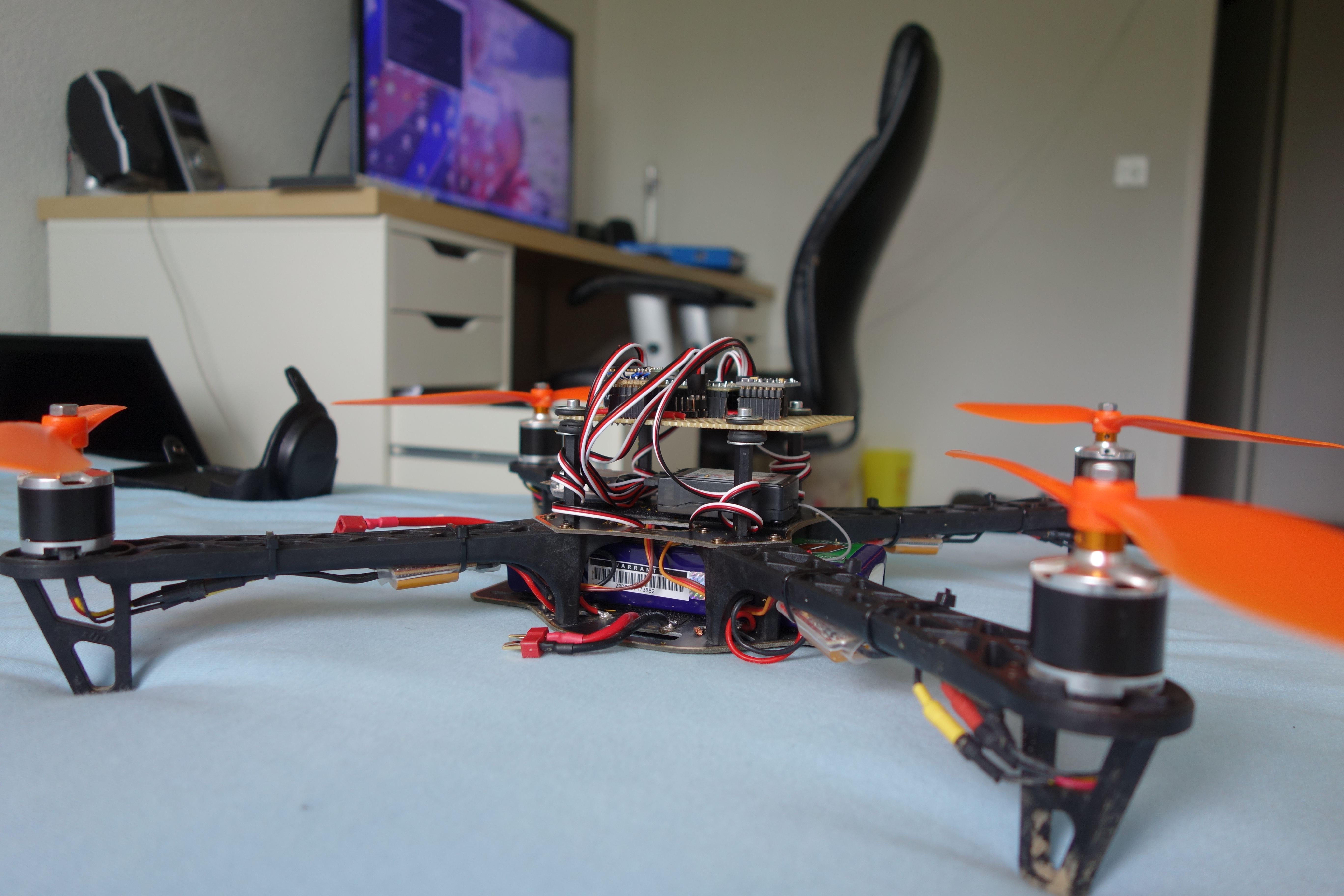My fully self designed first stable working Quadrocopter Software.

Diff: main.cpp
- Revision:
- 0:12950aa67f2a
- Child:
- 1:5e2b81f2d0b4
--- /dev/null Thu Jan 01 00:00:00 1970 +0000
+++ b/main.cpp Mon Sep 02 15:04:22 2013 +0000
@@ -0,0 +1,79 @@
+#include "mbed.h"
+#include "LED.h" // LEDs framework for blinking ;)
+#include "PC.h" // Serial Port via USB by Roland Elmiger for debugging with Terminal (driver needed: https://mbed.org/media/downloads/drivers/mbedWinSerial_16466.exe)
+
+#include "IMU_10DOF.h" // Complete IMU class for 10DOF-Board (L3G4200D, ADXL345, HMC5883, BMP085)
+#include "RC_Channel.h" // RemoteControl Channels with PPM
+#include "PID.h" // PID Library (slim, self written)
+#include "Servo_PWM.h" // Motor PPM using PwmOut
+
+#define PPM_FREQU 495 // Hz Frequency of PPM Signal for ESCs (maximum <500Hz)
+#define INTEGRAL_MAX 300 // maximal output offset that can result from integrating errors
+#define AILERON 0 // RC
+#define ELEVATOR 1
+#define RUDDER 2
+#define THROTTLE 3
+#define ROLL 0 // Axes
+#define PITCH 1
+#define YAW 2
+
+bool armed = false; // this variable is for security (when false no motor rotates any more)
+float P = 1.0; // PID values
+float I = 0;
+float D = 2.0;
+float controller_value = 0; // The calculated answer form the Controller
+float Motor_speed[4] = {0,0,0,0}; // Mixed Motorspeeds, ready to send
+
+LED LEDs;
+PC pc(USBTX, USBRX, 921600); // USB
+IMU_10DOF IMU(p28, p27);
+RC_Channel RC[] = {RC_Channel(p5,1), RC_Channel(p6,2), RC_Channel(p8,4), RC_Channel(p7,3)}; // no p19/p20 !
+PID Controller(P, I, D, INTEGRAL_MAX); // X:Roll alone
+Servo_PWM ESC[] = {Servo_PWM(p21,PPM_FREQU), Servo_PWM(p22,PPM_FREQU), Servo_PWM(p23,PPM_FREQU), Servo_PWM(p24,PPM_FREQU)}; // p21 - p26 only because PWM needed!
+
+void executer() {
+ pc.putc(pc.getc());
+ LEDs.tilt(2);
+}
+
+int main() {
+ pc.attach(&executer);
+ while(1) {
+ // IMU
+ IMU.readAngles();
+ //IMU.readAltitude(); // reading altitude takes much more time than the angles -> don't do this in your fast loop
+ //pc.printf("%.1f,%.1f,%.1f,%.1f'C,%.1fhPa,%.1fmaS,%.5fs,%.5fs\r\n", IMU.angle[0], IMU.angle[1], IMU.angle[2], IMU.temperature, IMU.pressure, IMU.altitude, IMU.dt, IMU.dt_sensors); // Output for Python
+
+ // Arming / disarming
+ if(RC[0].read() < 40) {
+ armed = false;
+ }
+ if((RC[0].read() > 40 && RC[0].read() < 1100)) {
+ armed = true;
+ }
+
+ // Controlling
+ Controller.setIntegrate(armed); // only integrate in controller when armed, so the value is not totally odd from not flying
+ controller_value = Controller.compute(0, IMU.angle[0]); // give the controller the actual angle and get his advice to correct
+
+ // Mixing
+ if (armed) // for SECURITY!
+ {
+ Motor_speed[0] = RC[0].read() - controller_value;
+ Motor_speed[1] = RC[0].read() + controller_value;
+ for(int i=0;i<4;i++) // Set new motorspeeds
+ ESC[i] = (int)Motor_speed[i];
+
+ } else {
+ for(int i=0;i<4;i++) // for security reason, set every motor to zero speed
+ ESC[i] = 0;
+ }
+
+ pc.printf("%d,%.3f,%.3f,%.3f,%.5fs,%.5fs,%4d,%4d,%4d,%4d\r\n", armed, IMU.angle[0], IMU.angle[1], IMU.angle[2], IMU.dt, IMU.dt_sensors, RC[0].read(), RC[1].read(), RC[2].read(), RC[3].read());
+ //pc.printf("%.3f,%.3f,%.3f,%.3f,%.3f,%.3f,%.5f\r\n", IMU.angle[0], IMU.angle[1], IMU.angle[2], IMU.Gyro.data[0], IMU.Gyro.data[1], IMU.Gyro.data[2], IMU.dt);
+
+ //wait(0.01);
+
+ LEDs.rollnext();
+ }
+}
\ No newline at end of file